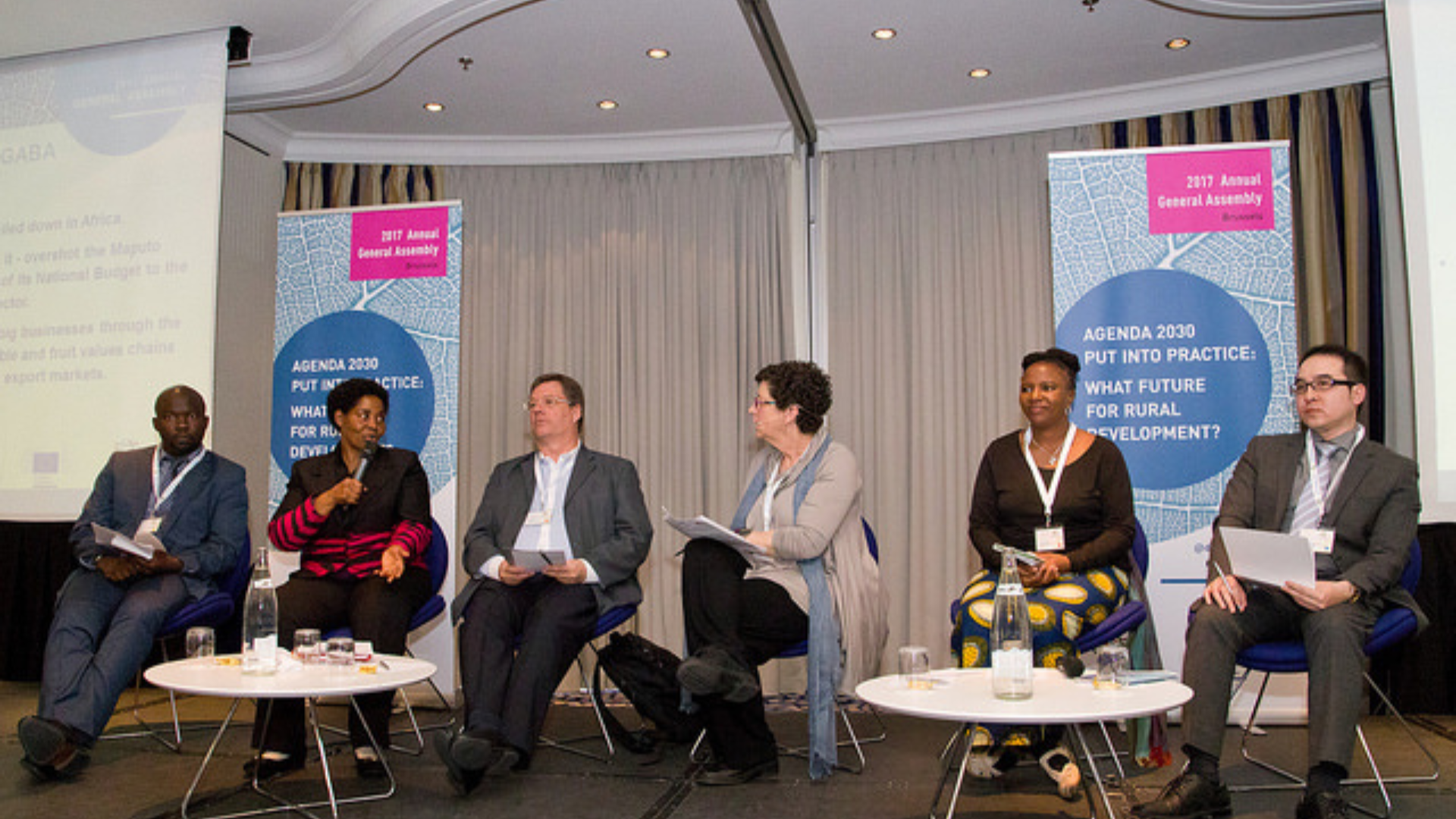PLATFORM | 1 – 2 FEBRUARY 2017 | BRUSSELS, BELGIUM
“Agenda 2030 put into practice: what future for rural development?”
The added value of the Platform was again reasserted during this years AGA – providing an open space to discuss trends and challenges in international cooperation. Furthermore participants agreed that the informal exchange between partners and donors will help reduce the complexity of rural transformation processes and approaches that Agenda 2030 would require to address them.

Links
At this year’s annual general assembly the participants discussed the possible future of rural areas in 2030. The first day started with welcoming remarks from Mr. Leonard Mizzi from the European Commission. In his opening remarks, he mentioned several global challenges – demographic boom in developing countries, changes in diets, rising inequalities and levels of migration, concentration of poor and rising pressure on the environments – the world and most specifically rural areas will face in the next couple of years. These stress factors push for a boost in sustainable agriculture practices and broadening of the rural agenda by focusing on territorial approaches and more sensitive rural-urban dynamics. Mr. Mizzi called on the participants to use the AGA to develop strategies to respond to the clear demand for inclusive processes that support rural economic development by building effective partnerships.
Panel Outcomes Day 1
The co-chairs of the Platform welcomed the participants. They praised the Platform as the only global network in the donor constituency working in the rural space. In light of the issues raised in the welcoming remarks they urged the participants to focus on emphasising research and science as the key for solutions needed in rural areas. The first panel discussed the way development partners would like to the see development cooperation in 2030. Mr. Wambo expressed his hope that donors will align their support with the priorities the countries have set for themselves. Furthermore, he reiterated the importance African youth will play for development. Donor interventions should support smallholder farmers to become entrepreneurs and foster private sector collaboration. Beatrice Byarugaba sees development as having access to good quality of food, nutrition security and purchasing power. There are African countries, who managed to reach this marks and in the next 10 years donors and partners countries should work closer together, learn from each other, cooperate and collaborate with research and technology, linking innovations to farmers. First step should be in efforts to support governments to commit to the provision of good quality services in rural areas. Ms. Esther Muiri joined the call for more collaboration and urged the donors to allow communities and women to be at the centre of development. Mr. Erich Schaitza reasserted what was said by the other panelists and added that research and extension services, organising farmers in associations have been some of the most important steps to secure food security in the past. Mr. Huy gave an insight of how South East Asia region is preparing for the implementation of the Agenda 2030. The focus has been and will remain on agribusinesses and accommodating the increased demand for food. The regional governments hope that dealing with these these new circumstances will also change the food value chains, creating new employment opportunities for farmers and changing food system practices.
Share

Key Platform Event
The Annual General Assembly is taking place every year and is hosted by different members, depending on the topic and their priorities.
The next panels gave an idea of where the international expert and donor communities see agriculture and rural development in international cooperation. The panel consisting of international experts from different areas highlighted again the major impacts and stresses that the agricultural sector will face by 2030. They recommended that actors should take a long term perspective and act to support the change of farming systems into sustainable agriculture. Also the efforts of donors need to make sure that the rural space gets more socio-economically and environmentally attractive and that their reduced budgets are wisely used to support country governments. The panelists agreed that the Agenda 2030 and environmental factors will create new production methods and codes, requiring new commitments to sustainability, value-chain development and resource management. In the last panel representatives from the donor community discussed the position of ARD in international cooperation.
Mr. Mizzi from the European Commission expressed the opinion that developing countries’ economies will continue to diversify over the next 15 years, focusing on provision of services and promotion of rural non-farm activities. He foresees that new food systems will increase productivity and herewith be able to still the demand, coming from the growing population in urban areas. Finland welcomed the positive impacts that the international agreement on the SDGs had for the international communities’ efforts in rural areas. SDGs have now institutionalised the linkages between food security and economic and social development. The focus of donors’ efforts in the next ten years should be on enabling the young girls of today to become motivated farmers in 2030. In the future Ms. Pekkola sees bilateral funding replaced by private sector, shortening the impact way, reducing transaction costs and opening the door to new technology and innovation. AfDB’s efforts will work to strengthen the social recognition of agriculture and address the demographic shift in the farming industry. Agriculture and farming should be seen as a business opportunity in 2030 and the majority of youth employed in the agricultural value chains. USAID welcomed the comments from the colleagues on the panel and emphasised the need to recognise the complexity of rural development and Agenda 2030. In the future, the US has taken steps to instituionalise their effort to ensure international food security and reduce poverty, as well as efforts to exchange and collaborate cross sectors and institutions.
Video
Steve Waddell talks about complexity and steps to reduce it in his keynote speech at the AGA 2017
The above video is an edited version of the keynote speech Steve Waddell delivered on the first day of the Annual General Assembly. You can find his presentation in our Downloads section below.
- Territorial approaches to food security and nutrition
- Agricultural transformation pathway initiative
- The case of PAA Africa
- Integrated country approach for promoting decent rural youth employment
- NDCs in ASEAN agriculture
- Initiative for the adaptation of African agriculture to climate change
- Enabling the business in agriculture
- Business for sustainable landscapes: an international action agenda
- Keynote speech Steve Waddell presentation
